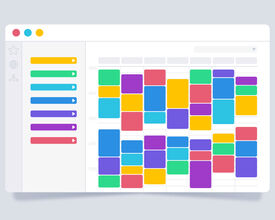Similar to in-person events, the program can make or break your online event. A successful program will engage a large audience, ensuring that nothing falls through the cracks.
A well-organized, engaging program will keep your audience interested and inspire them to take action afterward; whereas a poorly planned event just might lose their attention before you know it. People will want to attend your online event because they’re seeking a fresh experience with new ideas from speakers and presenters who are experts in their field.
And that’s something you’ll want to consider when designing and articulating your program. The success of your online event will depend on the quality of your program. What you choose to put in place for learning, entertainment, and engagement will affect the satisfaction and the experience of your attendees. Note that aside from how the content is presented, there are many steps that go into creating a successful online event. Let’s discover them one by one:
Step 1. Define your goal and KPI
You can’t design a program without defining the main goal of your online event along with the metrics you’ll be analysing. Here are some common goals you might be pursuing:
- Community: Launch an online event to increase the number of followers, establish yourself as a thought leader, and build your community.
- Brand awareness: Run the online event to promote your brand or product for the purpose of building a customer base.
- Retention: Plan an online event that will help you maintain the current customer base and up-sell them additional products.
- Conversion: Use online events as a tool for driving high-quality leads.
Once you've defined your goal, it’s necessary to identify the metrics that will help you measure progress towards that goal. For example, if you want to increase retention, then it might be wise to look at what percentage of users who attended an event went on to buy something from your website afterwards. This information will help you craft your online event program. For example, if you want to position yourself as a thought leader, you can bring industry stakeholders as speakers and run an online event based on knowledge sessions. If you want to attract more leads, on the other hand, you can plan an online event program focused on different workshops that showcase the way your product works. In any case, your online event goal and KPI will dictate the type of activities you should include in your program.
Step 2. Identify your ideal attendee persona
Identifying your ideal attendee persona is critical for crafting an effective online event program. The first step in this process is to identify who will be attending the event, as each group has different needs and interests. For example, an online summit might have a specific target audience of employees with at least 10 years' worth of experience working for companies of 100 or more people; smaller online seminars would benefit from targeting younger professionals still building their careers. Also, you need to identify the challenges your attendee persona is facing. This way you’ll be able to craft an online event program that caters to them.
Step 3. Choose one topic and define different subtopic lines
Brainstorm event topic ideas based on the challenges your attendee persona has. This step will help you come up with a global online event topic. Also, remember that a good way to break up a program into manageable pieces is by identifying different sub-topics related to the main subject. For example, if you’re running an online event about digital marketing, you can define different sub-topics, such as social media, SEO, email marketing, etc. This helps your audience better organise what they want to learn and when they want to learn it.
Step 4. Find the right speakers for each sub-topic
If you're trying to find the right event speakers, remember that many factors go into choosing them. First off, consider their field of expertise. Do they have the experience and the knowledge to talk about the sub-topic you’ve included in your online event program? If not, then they may not be the best speaker for your audience. Next, make sure they have enough experience and credentials (such as an advanced degree). These things will help ensure a meaningful and valuable presentation. If it's too hard to find people you're interested in hearing speak, then you should consider expanding the topic of the event so that more potential speakers are available for hire.
Step 5. Design a series of online event dynamics
When preparing for an event, consider the profile of your speakers and what they are best suited to do. Some may be good as keynote speakers; others may excel during roundtables. We recommend that you design different online event sessions with a range of activities including keynote speeches, panels, speed talks, workshops and more to keep things fresh for attendees who might attend multiple events.
Step 6. Articulate all these elements into a well-crafted online event program
A program should not be a quick list of speakers and topics but rather an in-depth look at each speaker and what they will be discussing. In order for your audience to feel connected with the event while they are unable to attend in person, you need them to know exactly what their experience would be like if they were there. A well-designed program can help capture this feeling by highlighting interesting facts about each speaker that will make them more relatable or explain why going through this particular speaker's talk is worth their time investment. It also helps set the tone of the day by giving an idea as to what attendees can expect throughout their time at your conference.
Wrap-up
It is essential to have a clear-cut, strategic approach when building an online event program. First, you need to define what your main goal and KPI is. Next, you have to proceed by identifying the profile and the challenges of your attendee persona. Then, you’ll choose the main topic of your online event (based on the solution to a challenge your attendee persona is experiencing) along with the sub-topics you’ll be covering. Subsequently, you have to find the right speakers for each sub-topics and design engaging online event dynamics. Finally, you have to organise all this information and create the program for your event.







